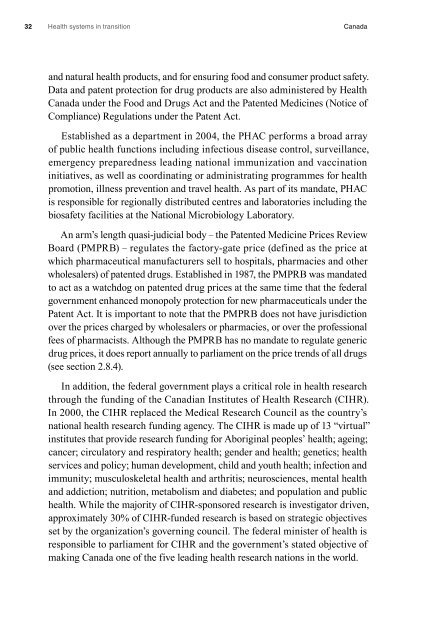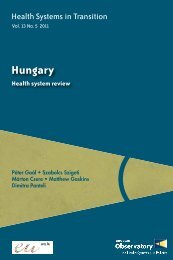Canada - World Health Organization Regional Office for Europe
Canada - World Health Organization Regional Office for Europe
Canada - World Health Organization Regional Office for Europe
Create successful ePaper yourself
Turn your PDF publications into a flip-book with our unique Google optimized e-Paper software.
32<br />
<strong>Health</strong> systems in transition <strong>Canada</strong><br />
and natural health products, and <strong>for</strong> ensuring food and consumer product safety.<br />
Data and patent protection <strong>for</strong> drug products are also administered by <strong>Health</strong><br />
<strong>Canada</strong> under the Food and Drugs Act and the Patented Medicines (Notice of<br />
Compliance) Regulations under the Patent Act.<br />
Established as a department in 2004, the PHAC per<strong>for</strong>ms a broad array<br />
of public health functions including infectious disease control, surveillance,<br />
emergency preparedness leading national immunization and vaccination<br />
initiatives, as well as coordinating or administrating programmes <strong>for</strong> health<br />
promotion, illness prevention and travel health. As part of its mandate, PHAC<br />
is responsible <strong>for</strong> regionally distributed centres and laboratories including the<br />
biosafety facilities at the National Microbiology Laboratory.<br />
An arm’s length quasi-judicial body – the Patented Medicine Prices Review<br />
Board (PMPRB) – regulates the factory-gate price (defined as the price at<br />
which pharmaceutical manufacturers sell to hospitals, pharmacies and other<br />
wholesalers) of patented drugs. Established in 1987, the PMPRB was mandated<br />
to act as a watchdog on patented drug prices at the same time that the federal<br />
government enhanced monopoly protection <strong>for</strong> new pharmaceuticals under the<br />
Patent Act. It is important to note that the PMPRB does not have jurisdiction<br />
over the prices charged by wholesalers or pharmacies, or over the professional<br />
fees of pharmacists. Although the PMPRB has no mandate to regulate generic<br />
drug prices, it does report annually to parliament on the price trends of all drugs<br />
(see section 2.8.4).<br />
In addition, the federal government plays a critical role in health research<br />
through the funding of the Canadian Institutes of <strong>Health</strong> Research (CIHR).<br />
In 2000, the CIHR replaced the Medical Research Council as the country’s<br />
national health research funding agency. The CIHR is made up of 13 “virtual”<br />
institutes that provide research funding <strong>for</strong> Aboriginal peoples’ health; ageing;<br />
cancer; circulatory and respiratory health; gender and health; genetics; health<br />
services and policy; human development, child and youth health; infection and<br />
immunity; musculoskeletal health and arthritis; neurosciences, mental health<br />
and addiction; nutrition, metabolism and diabetes; and population and public<br />
health. While the majority of CIHR-sponsored research is investigator driven,<br />
approximately 30% of CIHR-funded research is based on strategic objectives<br />
set by the organization’s governing council. The federal minister of health is<br />
responsible to parliament <strong>for</strong> CIHR and the government’s stated objective of<br />
making <strong>Canada</strong> one of the five leading health research nations in the world.
















